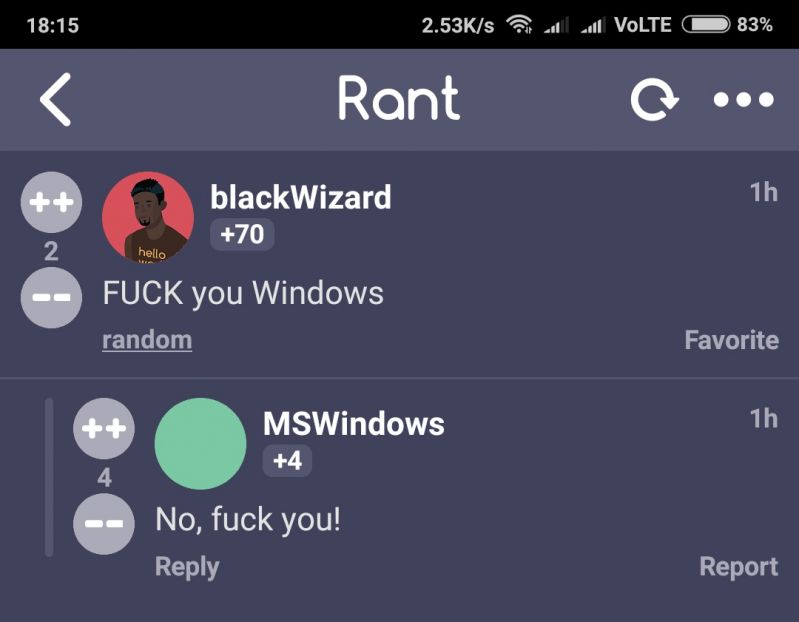Ranter
Join devRant
Do all the things like
++ or -- rants, post your own rants, comment on others' rants and build your customized dev avatar
Sign Up
Pipeless API

From the creators of devRant, Pipeless lets you power real-time personalized recommendations and activity feeds using a simple API
Learn More
Comments
-
 Hazarth91812yperhaps because both google and microsoft want to force you to use chrome, so they design proprietary browser functions that their websites use, but firefox can't... just throwing this idea out there, it is possible given the stuff going on currently
Hazarth91812yperhaps because both google and microsoft want to force you to use chrome, so they design proprietary browser functions that their websites use, but firefox can't... just throwing this idea out there, it is possible given the stuff going on currently -
If you seriously don't know, you are in to quite some bad surprises in this world.
Unfair competition exists. -
Ungoogled chromium can help you with those fucking sites.
Besides that, you need to block merchan and telemetry js with some browser addon or at dns level otherwise the js engine fails and becomes slowish. -
 hjk10156092y@retoor https://fortune.com/2018/07/...
hjk10156092y@retoor https://fortune.com/2018/07/...
Nope this has been a thing for a long time. This is just one of the tricks they pulled. -
 Hazarth91812y@retoor even if it does, it wont for long once google implements all their little money grubbing strategies that only non chromium browsers will be able to avoid
Hazarth91812y@retoor even if it does, it wont for long once google implements all their little money grubbing strategies that only non chromium browsers will be able to avoid -
 hitko29952y@hjk101 That's a weird way of saying that things are slower due to Firefox sucking at implementing new APIs and technologies as they become available in other browsers.
hitko29952y@hjk101 That's a weird way of saying that things are slower due to Firefox sucking at implementing new APIs and technologies as they become available in other browsers. -
 hjk10156092y@hitko read it again. They (google) use an old API that never made it to the standard on purpose. So it only ran fast on Chrome that still also implemented the experimental API.
hjk10156092y@hitko read it again. They (google) use an old API that never made it to the standard on purpose. So it only ran fast on Chrome that still also implemented the experimental API.
There are a host of other whoops we broke it on Firefox cases. So many it became all very suspicious but it's hard to prove it was on purpose. I still don't know what to believe there. But the YouTube shadow domv0 case was seriously suspicious because polymer is webcomponents lib that basically existed to implement webcomponents based on the standards as fast as possible. My team used it even with v1 at the time. I'm convinced it was not an oversight but deliberate. -
 hitko29952y@hjk101 First of all the article never states that Google did it on purpose, so stop lying.
hitko29952y@hjk101 First of all the article never states that Google did it on purpose, so stop lying.
Second, at the time the article has been published (mid 2018) Chrome already had v0 support for over 4 years, while Firefox and Edge only just added support for v1 a few months prior, and neither of those browsers implemented the v0 API at all despite having plenty of time to do so before v1 API has been established.
Third, when Google started working on the new YouTube interface (presumably a year or so prior), neither Firefox nor Edge supported any web components APIs. The v1 API has been just released as a preview, while the v0 already had a lot of traction and an established UI framework. So it's obvious that Google used the v0 because it was a more mature ecosystem at the time, not because it would make other browsers slow.
And if Firefox and Edge implemented the v0 API sometime before v0 got deprecated, there would be no problem with any of that. -
 hjk10156092y@hitko I didn't lie about the article, I state they did it on purpose. The article states experimental domv0 use.
hjk10156092y@hitko I didn't lie about the article, I state they did it on purpose. The article states experimental domv0 use.
I will always commend Google for their contribution to web standards. Spdy turned http2 and webcomponents can almost solely be attributed to Google. A less popular opinion
However demanding other browsers to implement draft/experimental APIs and releasing it to the public is just silly.
In fact little over two months after the article Google released chrome 70 that prints all kinds of webcomponents v0 depreciation notices. I would expect Google to be the first to adopt standards they helped create on their flagship products.
"The Web Components v1 APIs are a web platform standard that has shipped in Chrome, Safari, Firefox, and (soon) Edge. The v1 APIs are used by literally millions of sites, reaching billions of users daily. Developers using the draft v0 APIs provided valuable feedback that influenced the specifications. But the v0 APIs were only supported by Chrome. In order to ensure interoperability, late last year, we announced that these draft APIs were deprecated and were scheduled for removal as of Chrome 73."
- Google July 9, 2019
Related Rants

 How to vertically center in css..
How to vertically center in css.. Made my day 😂😂
Made my day 😂😂
I don't know if its Firefox the browser is TRASH or something else? Cause, every time I visit a website made by Google or Microsoft ( Linkedin for instance ), firefox becomes painfully slow and absolutely unusable. Every click takes few seconds to process and so on. but in Chrome, all ok! Why? -_-
rant
firefox
google
trash
microsoft
chrome